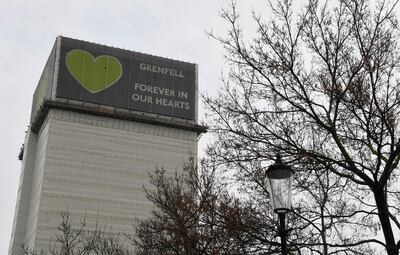Despite a pandemic-shaped blip when international buyers dwindled and a small cohort decided that the space afforded by a rural lifestyle was more to their tastes, London's property sector has proven remarkably resilient to economic fluctuations.
This resilience is set to be tested by a steep rise in borrowing costs.
The average two-year fixed-rate on a home loan climbed to 5.97 per cent after the government’s U-turn on cutting the top-rate of tax failed to allay market fears over UK Chancellor Kwasi Kwarteng's mini-budget brew of borrowing and tax cuts for the highest earners.
In light of these soaring mortgage rates, paired with the pound's recent travails, London's property brokers provide The National with five things that could help the market prosper in the face of economic ferment.
1. Reduce stamp duty to attract international buyers
"While the UK Chancellor did commit to making more homes exempt from stamp duty in his notorious mini-budget, it is first-time buyers who stand to benefit rather than international buyers or second-home owners. London's brokers would like this to change," said Mark Parkinson, managing director of buying agency Middleton Advisors.
"If you're looking to stimulate demand and interest then the obvious thing would be [reducing] the stamp duty surcharge in its various forms.
"If you own more than one property in the world, currently you have to pay a three per cent surcharge."
Mr Parkinson would also like to see changes to the annual tax levied on companies that own residential property in the UK valued at more than £500,000 ($553,220).
He believes a simplification in the ATED rules would encourage international buyers to own properties in corporate structures as it is "otherwise advantageous".
Christian Warman, partner at Tedworth Property, agrees that the current taxation rubric is disincentivising.
"Charging people who don't have a British passport more is just not a good look for this country, which is open to international investment," he said. "I think the playing field should be balanced."
To this end, Mr Warman would like to see the same stamp duty rules that apply to domestic buyers apply to second homeowners as well.
2. Resolve the cladding farrago
After the Grenfell Tower tragedy in 2017, the EWS1 process was established in December 2019 as a means for building owners to confirm that an external wall system on residential properties has been assessed for safety by an independent expert in line with government guidance.
It was designed to offer much-needed assurance to everyone involved in the transaction but has come in for criticism for being overly bureaucratic and opaque.
In an attempt to address these criticisms, in March this year the government digitised the form, allowing for a clearer audit trail. Although a start, Mr Warman wants even greater clarity around the form.
"It's a question of sorting out and clarifying what is actually needed in terms of EWS1 and cladding compliance in order to make it easier for international buyers.
"In my experience, buildings without a valid EWS1 can put buyers off."

3. Overhaul conveyancing and planning
“I would like to see an overhaul of the conveyancing process, starting with offers becoming legally binding," said Middleton Advisors' Stuart Mun-Gavin.
"This would remove unnecessary costs, endless uncertainty for both buyer and seller, gazumping and everything that makes moving house utterly miserable.
"I recently had a client who spent £27,000 on the process only for the vendor to change their mind at the point of exchange and not sell.”
Mr Mun-Gavin also wants to see the planning process "simplified to make it easier and more time efficient".
"Maybe have a governing body that reviews each borough/county,” he said.
4. Regenerate Knightsbridge and revive Middle East interest
Over the past 10 years, one of the most successful trends in property development has been the transmutation of distinctly urban and incoherent London high streets into locales which cater for their residents' every whim.
"It's been done so successfully [in recent times] by Grosvenor and Howard de Walden," Mr Warman said.
"Roll that out in other areas like Knightsbridge, which has been an area traditionally very popular with Middle Eastern buyers and is shouting out for this kind of renovation.
"Middle Eastern buyers now tend to congregate on Pavilion Road in Sloane Square, which was regenerated four to five years ago.

5. Appeal to UAE buyers with commercial-residential hybrids
In early 2023, a new luxury hotel is set to open in the heart of Belgravia.
According to its website, The Peninsula London "will showcase the best of British culture, art, and cuisine".
It boasts 190 rooms it's promises are the quintessence of luxury but of most interest to Middleton Advisors' Mark Parkinson, it also features 25 opulent residences for sale.
Mr Parkinson would like to see to more commercial-residential hybrids and thinks the combination is a heady mix for UAE buyers who he said "put money down at a very early stage for these developments".
"Where properties are serviced by a hotel, they've always sold very well," he said.

